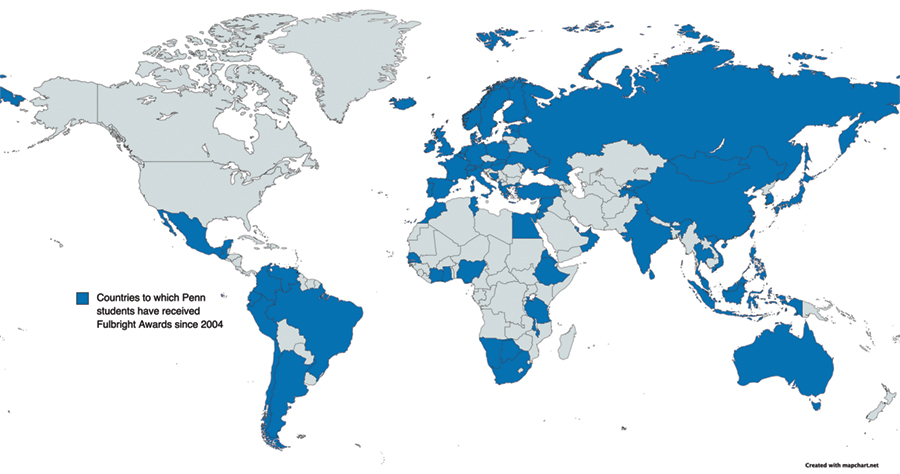
Two decades after its founding, Penn’s Center for Undergraduate Research and Fellowships continues to be “for everyone.”
Joshua Bennett C’10 was looking for a towel in the linen closet of his parents’ home in Yonkers, New York, when he noticed he had a voicemail. Pressing his phone to his ear, he couldn’t believe the message.
Bennett, then a Penn senior who had never left the country and didn’t even have a passport, had just received a prestigious Marshall Scholarship to pursue graduate studies in the United Kingdom for the 2010–11 academic year [“Gazetteer,” Mar|Apr 2010].
“I had no sense of that world as a young person,” recalls Bennett, now a professor of English and creative writing at Dartmouth College who last year was awarded a Guggenheim Fellowship. “My parents both worked for the post office. There were no academics in my family. I was the first one to go to graduate school and get a PhD.”
But, he adds, “what was part of my family’s culture was studying. Reading was very important. Listening to music was important. Writing was important.” So when he arrived at Penn as an undergraduate, he sought out peers with similar interests. And when his friend Hayling Price C’09 received a Truman Scholarship, “it started this whole network,” Bennett says, “especially with young Black male scholars, who were helping me think about fellowships as a step into a much larger career as a researcher and an educator.”
Once looped into Penn’s Center for Undergraduate Research and Fellowships (CURF)—which helps students through the application process for fellowships, scholarships, grants, and other research opportunities—Bennett applied for and was a finalist for the Truman and Rhodes Scholarships, before becoming the first African American from Penn to receive a Marshall. An Africana Studies major and spoken-word poet who performed in front of President Obama at the White House and spoke at Penn’s 2010 Commencement, Bennett pursued a master’s in theater and performing arts at the University of Warwick. The “transformative and vibrant” experience helped him carve his own research path there while enjoying a “sense of camaraderie” with the people he met across the Atlantic.
“I already knew I wanted to be a professor,” he says. “But I would say it gave me a better sense of what that path might look like. And it gave me some of the instruments I needed to navigate the path.”

Founded in 2001 but celebrating its 20-year anniversary this spring through panel discussions with students and alums, CURF has helped many others like Bennett. Per numbers supplied by CURF, the center’s advisors meet with more than 500 students and alumni each year to explore nearly 2,000 potential fellowship opportunities. Since CURF’s founding, nearly 400 students and alumni have received Fulbright Awards and more than 600 in all have earned “major” nationally competitive fellowships—which include the Rhodes, Marshall, Mitchell, Gates Cambridge, Churchill, Fulbright, Truman, and several others.
While the Rhodes Scholarship is the oldest and most well-known—and one in which Penn has showed dramatic growth, going from six Rhodes Scholars from 1939 to 2000, to six over the following 13 years, to 11 from 2015 to 2022—CURF executive director Jane Morris ensures that students learn about all fellowship opportunities. (The Rhodes also wouldn’t make sense, say, for a student who wants to study in a graduate program that isn’t offered at the University of Oxford.) She’s particularly fond of the Fulbright, which doesn’t have a GPA requirement and allows students to essentially choose the country where they would like to study and the subjects they would like to research. Recent recipients include Claire Sliney C’21, who was awarded a Fulbright-National Geographic Storyteller Grant to conduct research and make a documentary film in France (she had previously won an Academy Award for a documentary short [“Gazetteer,” May|Jun 2019]), and Wilson Fisher C’19, who earned a research grant to Ukraine to study photography made in the wake of the 2014 Euromaidan Revolution.
“In the world we are living in right now, the whole point of the Fulbright is soft diplomacy,” says Morris, who arrived at Penn in 2019 after stints at Villanova and Duke, replacing Harriet Joseph, who served as CURF’s executive director from 2008 until her retirement in 2018. “It’s about taking the best of America to the rest of the world—building relationships across boundaries through the lens of academics and education and research.”
Morris is also trying to grow participation for other “more accessible” fellowships like the Truman Scholarship (“for change agents, typically working in areas that involve public service”) and the Udall Undergraduate Scholarship, awarded to students interested in Native American and environmental issues.
Getting the word out to undergraduates is a perpetual challenge for CURF’s staff members. They start early by working with Penn Admissions and making their presence known at New Student Orientation, and they also partner with Penn First Plus, the Greenfield Intercultural Center, Career Services, College Houses, and other campus centers. “We want to get students into our office as soon as possible, because the opportunity to engage in research starts in their first year,” Morris says.
“The best advertising are the students themselves,” adds Ann Vernon-Grey, CURF’s senior associate director for undergraduate research, adding that “people come in often thinking of one fellowship and leave thinking they’re going to apply for seven or 10.” And the Penn Undergraduate Research Mentoring Program (PURM) offers an avenue for students to assist a Penn faculty member on a research project without traveling abroad—“a pillar of the work we do,” Morris notes, along with the Benjamin Franklin Scholars and University Scholars programs for research-curious students interested in independent thinking.
“I think the take-home is CURF is for everyone,” Morris says. “We’ve got something for everybody.”
And while Vernon-Grey likens the chances of earning a nationally competitive fellowship to The Hunger Games (“the odds are not in your favor”), she notes that the students CURF benefits the most are those “who don’t otherwise have the social capital to know what a Rhodes is.” Bennett learned that a decade ago and has since tried to pass on those lessons to his own students at Dartmouth while providing mentorship to recent fellowship recipients from Penn like College senior Chinaza Ruth Okonkwo, who in December was named a 2022 Marshall Scholar along with classmate Kennedy Crowder. (Other recent Penn honorees include 2022 Rhodes Scholars Raveen Kariyawasam and Nicholas Thomas-Lewis and Mitchell Scholar Max Wragan).
“My hope is they continue to expand and continue to find candidates that are off the radar,” Bennett says. “I was an incredibly nontraditional candidate. And doing this kind of stuff changed my life.” —DZ




